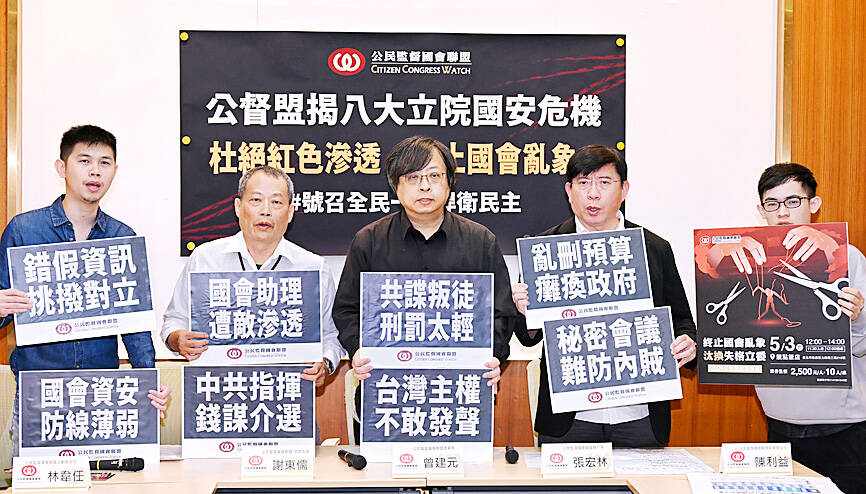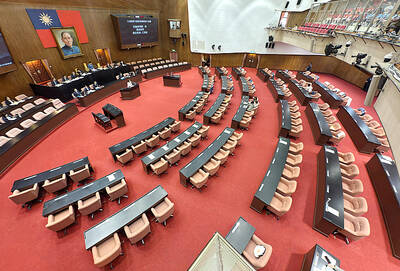Taiwan is facing severe national security threats due to enemy infiltration and espionage activities inside the legislature, Chinese funding to meddle in elections and influence politicians, and lawmakers colluding to slash the government’s fiscal budget and blocking bills to enhance safeguards for Taiwanese sovereignty, Citizen Congress Watch (CCW) said yesterday.
Unlike the US’ bicameral congress, Taiwan has a unicameral legislature, placing national sovereignty at a greater risk, “because all legislative bills, government budgets and top official appointments need only to be approved by [a single-house] legislature, and when it is involved in a security breach, the government and society as a whole are in danger,” CCW director Chang Hung-Lin (張宏林) told a news conference in Taipei.
“This past year, we saw two opposition parties acting to betray the interests of this country and its people... We also have had multiple cases of infiltration targeting lawmakers and their aides to spy for China,” Chang said.

Photo: Fang Bin-chao, Taipei Times
CCW’s main work is to monitor and evaluate the performance of lawmakers, but the Chinese Nationalist Party (KMT) and the Taiwan People’s Party (TPP) have refused to cooperate, he said.
CCW executives listed eight major national security crises in Taiwan’s legislative system: enemy infiltration into lawmakers’ offices and their aides to spy for China; disinformation campaigns to sow conflict in the legislature; Chinese money being channeled into Taiwan to interfere in elections and buy influence; courts handing out too lenient sentences on Chinese espionage cases; too few legislators speaking up for Taiwanese sovereignty; opposition parties slashing budgets to paralyze the ruling party; a lack of awareness and safeguards for information security in the legislature; and failure to stop leaks of classified information during legislative meetings to discuss military affairs, weapons procurement and national security issues.
CCW chairman Tseng Chien-yuan (曾建元) presented a “list of worst legislators” whose actions have undermined national security and betrayed Taiwan’s interests by using legislative procedures and underhanded ploys to impede the progress of important bills to boost defense spending and safeguard Taiwan from Chinese infiltration and leaking of state secrets.
Topping the list is KMT Legislator Lin Shih-ming (林思銘), who blocked 124 national security-related bills this legislative session.
TPP legislators Lin Kuo-cheng (林國成) and Huang Kuo-chang (黃國昌) tied for second place, as both blocked 110 national security-related bills, while KMT Legislator Hung Meng-kai (洪孟楷) placed fourth for blocking 41 such bills.
They were followed in descending order by KMT Legislator Wang Hung-wei (王鴻薇), who blocked 25 similar bills, and three KMT legislators-at-large — Weng Hsiao-ling (翁曉玲), Wu Tsung-hsien (吳宗憲) and Lin Chien-chi (林倩綺), who blocked 24, 23 and 23 such bills respectively, Tseng said.

CROSS-STRAIT COLLABORATION: The new KMT chairwoman expressed interest in meeting the Chinese president from the start, but she’ll have to pay to get in Beijing allegedly agreed to let Chinese Nationalist Party (KMT) Chairwoman Cheng Li-wun (鄭麗文) meet with Chinese President Xi Jinping (習近平) around the Lunar New Year holiday next year on three conditions, including that the KMT block Taiwan’s arms purchases, a source said yesterday. Cheng has expressed interest in meeting Xi since she won the KMT’s chairmanship election in October. A source, speaking on condition of anonymity, said a consensus on a meeting was allegedly reached after two KMT vice chairmen visited China’s Taiwan Affairs Office Director Song Tao (宋濤) in China last month. Beijing allegedly gave the KMT three conditions it had to

‘BALANCE OF POWER’: Hegseth said that the US did not want to ‘strangle’ China, but to ensure that none of Washington’s allies would be vulnerable to military aggression Washington has no intention of changing the “status quo” in the Taiwan Strait, US Secretary of Defense Pete Hegseth said on Saturday, adding that one of the US military’s main priorities is to deter China “through strength, not through confrontation.” Speaking at the annual Reagan National Defense Forum in Simi Valley, California, Hegseth outlined the US Department of Defense’s priorities under US President Donald Trump. “First, defending the US homeland and our hemisphere. Second, deterring China through strength, not confrontation. Third, increased burden sharing for us, allies and partners. And fourth, supercharging the US defense industrial base,” he said. US-China relations under

The Chien Feng IV (勁蜂, Mighty Hornet) loitering munition is on track to enter flight tests next month in connection with potential adoption by Taiwanese and US armed forces, a government source said yesterday. The kamikaze drone, which boasts a range of 1,000km, debuted at the Taipei Aerospace and Defense Technology Exhibition in September, the official said on condition of anonymity. The Chungshan Institute of Science and Technology and US-based Kratos Defense jointly developed the platform by leveraging the engine and airframe of the latter’s MQM-178 Firejet target drone, they said. The uncrewed aerial vehicle is designed to utilize an artificial intelligence computer

The Chinese Nationalist Party (KMT) caucus yesterday decided to shelve proposed legislation that would give elected officials full control over their stipends, saying it would wait for a consensus to be reached before acting. KMT Legislator Chen Yu-jen (陳玉珍) last week proposed amendments to the Organic Act of the Legislative Yuan (立法院組織法) and the Regulations on Allowances for Elected Representatives and Subsidies for Village Chiefs (地方民意代表費用支給及村里長事務補助費補助條例), which would give legislators and councilors the freedom to use their allowances without providing invoices for reimbursement. The proposal immediately drew criticism, amid reports that several legislators face possible charges of embezzling fees intended to pay